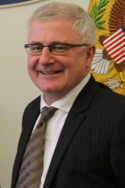Guest Post by Sam Sharp, a member of the NZ Youth Delegation in Doha
This morning I stood with 40 other youth from all around the world to represent the voices of 1.5 billion youth who are not directly represented here at the climate change negotiations in Doha.
We stood for one and a half hours, while thousands of negotiators and NGO’s passed us on their way to the negotiations. The response was pretty overwhelming.
Between us in NZYD, we were interviewed by eight different international journalists. Youth that I had never met in my life came and stood next to me to hold up the boards with our message
”Dear Negotiators, 1.5 billion youth are not directly represented here at COP18. Your decisions must reflect their demands”.
The Irish ex-president and nobel peace prize winner , Mary Robinson, shook our hands. Thousands of photos were taken, iPhones and cameras left right and centre.
But to me, this international media attention was not what made this experience so special.
What blew me away, was the exchanges of smiles from a select few negotiators and this huge sense of pride I felt from standing with youth from all over the world who are fighting for action on climate change.
Negotiators who looked us in the eye, acknowledging our message and saying “We are with you” have given me this new sense of hope among this place full of cold stares and pressed business suits. In particular, it was the negotiators from the developing countries that really stopped to acknowledge what we were doing, as many of their youth are un-represented here at COP.
I have learnt this morning, that as youth we can give such a powerful message to the world, simply by standing together to show that regardless of our nationalities, we are all here for the same reason.
We are here to be heard, and we are here to show that we already doing what we can to make sure that our generations actions make a positive, lasting change. Regardless of the amount of negotiators that gave us a smile, it is us – today’s youth – that have shown that we have the strength in numbers and unity to actually make change.

 People send me stuff. Imagine my surprise when this morning’s mail included the text of a round robin email from Tom Harris — the Canadian PR man who heads the Heartland-funded denialist lobby group the International Climate Science Coalition [full text
People send me stuff. Imagine my surprise when this morning’s mail included the text of a round robin email from Tom Harris — the Canadian PR man who heads the Heartland-funded denialist lobby group the International Climate Science Coalition [full text  Climate Change Minister Tim Groser gave a substantial and intelligently argued
Climate Change Minister Tim Groser gave a substantial and intelligently argued  The
The  Emma Renowden is attending the first few days of the UN climate change conference in Bonn. In this guest post she looks at how negotiations are progressing, what the major issues are likely to be, and what New Zealand’s up to.
Emma Renowden is attending the first few days of the UN climate change conference in Bonn. In this guest post she looks at how negotiations are progressing, what the major issues are likely to be, and what New Zealand’s up to.